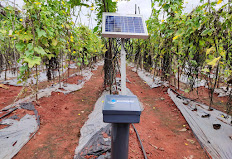Groundwater Depletion Due To Over-Irrigation
The modern consumer is nowadays more conscious of buying sustainable or organic agricultural products because of health and environmental reasons. However these efforts, while laudable, are only worth it if the product being consumed is grown in the right manner. This means that agriculturists have to take care, especially in areas with inconsistent water supply and mixed soil like India, that their irrigation methods are sustainable, but without depleting groundwater in any way.
This is not an idle fear. The Central Ground Water Board (CGWB) in the Fifth Minor Irrigation Census[1] has posited that more than 1000 blocks in India have become water stressed since the Green revolution caused Indian farmers to depend more on groundwater rather than rainwater for their needs. According to this alarming report, the groundwater level in India has declined by 61 per cent between 2007 and 2017 and of the extracted water 89 per cent is used for irrigation, according to the census.
This is not just an Indian, but an international problem to which India contributes a lot. Some 11 per cent of global non-renewable groundwater drawn up for irrigation is used to produce crops that are traded on the international market. Two-thirds of the exported crop that uses non-renewable groundwater is produced in three countries – Pakistan (29 per cent), United States (27 per cent) and India (12 per cent). The crops that contribute the most to trade of non-renewable groundwater are rice (29 per cent), wheat (12 per cent), cotton (11 per cent), maize (4 per cent) and soybeans (3 per cent).[2]
So what happens when groundwater reduces? What can the farmers do? As Susan Stratton Sayre in her 2018 article published in Journal of Environmental Economics and Management, they are basically left with two alternatives:
a) Deepen their existing wells buy using more powerful pumps, or
b) Reducing the amount of land they are irrigating (acreage)
These have far reaching consequences. Here are some of them:
1. Deepening wells mean high investment, more electricity consumption and high maintenance costs
2. Farmers are likely to move to hardier, less water-dependent crops (cash-cropping), or riskier crops like cotton and chilly
3. Borewell failures, greater debt, leading to farmer suicides
4. For those who can afford it, cheaper electricity in turn can lead to greater groundwater depletion because of running powerful motors
A new study by researchers from the University College London, International Institute for Applied Systems Analysis, Columbia University’s Climate Research Centre and NASA’s Goddard Institute of Space Studies quoted data from United Nations and OECD-FAO projections of food demand and water availability suggested that the depletion would continue in the absence of targeted measures by the governments and farming communities in several affected countries. Addressing this will require both food importing and exporting countries like India to make changes to the way food is grown and consumed.[3]
Water-saving strategies such as improving irrigation efficiency and growing more drought-resistant crops, together with targeted measures such as metering and regulation of groundwater pumping will need to be implemented. These policy changes need take into account socio-economic, cultural and environmental aspects, and the region's hydrogeology to increase groundwater conservation efforts, and farmers’ awareness about the optimal irrigation intensity and cropping patterns.
Shantanu Bhattachariya – EVM & Knowledge Academy Head
Wadhwani Foundation
[1] http://www.indiaenvironmentportal.org.in/files/file/Report%20of%205th%20Census%20of%20Minor%20Irrigation%20Schemes.pdf
[2] https://economictimes.indiatimes.com/news/economy/agriculture/heres-reason-behind-depleting-groundwater/articleshow/57967395.cms?from=mdr
[3] https://www.downtoearth.org.in/blog/water/depleting-groundwater-costs-farmers-heavily-65530



Comments
Post a Comment